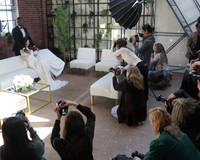The Camera Store Blog

Sony Get Paid to Trade - Spring Program
Are you feeling like you need a change? Have you been eyeing up a new Sony Full-Frame Mirrorless Camera but wasn’t sure if it was the right time? Well, this is your sign because you can now enjoy the perks of our Sony Get Paid to Trade Program!

Fujifilm X-Series Lens Sale
Fujifilm's X-Series lenses are renowned for their unparalleled image quality, exceptional sharpness, and versatile functionality, and you can experience it all while saving big during our Fujifilm X-Series Lens Sale!

Sigma and Tamron Announce Canon RF Mount Lenses
The Canon mirrorless system just got even better thanks to an announcement from Sigma and Tamron. Until now, the Canon RF mount only worked with Canon-made lenses, but that's all changed. Both parties just announced lenses for Canon's mirrorless RF mount cameras.

Sony Alpha Community + The Camera Store - The Love Through The Lens - Wedding Photo Experience
We recently hosted an unforgettable Sony Alpha Community event, The Love Through The Lens - Wedding Photo Experience, at The Hemingway Room, and it was nothing short of amazing! Our guests had an absolute blast trying out the latest Sony cameras and lenses with models, sets, and lighting, with inspiration from professional wedding photographers. The event provided an exciting and fun opportunity for photographers to connect with like-minded individuals in our community all while getting to enjoy the incredible brand that is Sony Alpha!

Hasselblad Masters 2023 - Open For Public Vote
This year's Hasselblad Masters competition experienced a record-breaking number of submissions with 85,000 images! Now it's time for you to be involved. Hasselblad has opened the public voting phase, encouraging you to vote for your favourite images.

Spring into Sony Sale
Are you ready to spring into action and upgrade your photography gear? Look no further than Sony's Spring into Sony Sale, where you can find unbeatable deals on a variety of Sony gear. From the high-end Sony a7R V to the versatile Sony a6400, there's something for every photographer in this sale. Don't miss out on these incredible offers before they're gone!

Canon Cashback Event
Upgrade your gear and SAVE BIG during Canon’s Cashback Event! With cash rebates of up to $150 on select products, this limited-time offer is too good to miss.

Fun In The Sun: Vlogging Throughout The Summer
With summer comes days in the sun, hikes, swimming, travels and many more fun adventures. With so much going on, it is the perfect time to start vlogging or up your vlogging game! Long days and epic activities will lead to beautiful and interesting vlogs. You know you’ve thought about it, so what are you waiting for?! To help you get started, we’ve gathered some of the best vloggers out there. Take a look at their content to get creative ideas and learn technical skills like what Sony camera and lenses will work best for you. Get more gear inspiration from our Best Primes Lenses For Vlogging and Best Zoom Lenses For Vlogging in 2023 lists. And for even more video and vlogging inspiration, subscribe to the Sony Alpha Universe YouTube Channel.

How to Stand Out in a Sea of Amazing Creators
I think that's often when the most rewarding art or projects come to fruition, when you step out of your comfort zone, work closely with wonderful people, and trust in the tools of your trade.

Tamron April Sale
Is it time for a little lens refresh? Look no further than Tamron's April Sale! Offering savings of up to $200 on select lenses now is the perfect time to invest in high-quality glass for your camera. Whether you're a beginner looking to step up your game or a seasoned pro in need of a new addition to your kit, Tamron has something for everyone.

Nikon April Sale
If you're a photography enthusiast or a professional looking to upgrade your gear, now is the perfect time to take advantage of the Nikon April Sale! With incredible discounts on a wide range of products, including Nikon Z series mirrorless cameras, DSLRs, lenses, binoculars, and other accessories, there's something for everyone. Don't miss your chance to snatch up savings on your dream Nikon gear and shop the Nikon April Sale now!

Why Delkin Black Memory Cards are the Secret Sauce For Photographers
One often overlooked but crucial component of a photographer's toolkit is the memory card. Delkin Devices Memory Cards are the secret sauce for pho...






